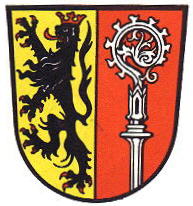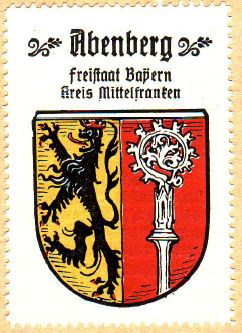Abenberg: Difference between revisions
Knorrepoes (talk | contribs) m (Text replace - "'''Origin/meaning :'''<br/>" to "====Origin/meaning====") |
Knorrepoes (talk | contribs) m (Text replace - "|width="15%"|50 px|right |}" to "|width="15%"|50 px|right |}<seo title="Wappen, Gemeindewappen" />") |
||
| Line 3: | Line 3: | ||
|width="70%" align="center" |'''Heraldry of the World<br/>Civic heraldry of [[Germany]] - [[Deutsche Wappen|Deutsche Wappen (Gemeindewappen/Kreiswappen)]]''' | |width="70%" align="center" |'''Heraldry of the World<br/>Civic heraldry of [[Germany]] - [[Deutsche Wappen|Deutsche Wappen (Gemeindewappen/Kreiswappen)]]''' | ||
|width="15%"|[[File:Germany.jpg|50 px|right]] | |width="15%"|[[File:Germany.jpg|50 px|right]] | ||
|} | |}<seo title="Wappen, Gemeindewappen" /> | ||
Revision as of 16:34, 5 November 2012
| Heraldry of the World Civic heraldry of Germany - Deutsche Wappen (Gemeindewappen/Kreiswappen) |
ABENBERG
State : Bayern
District (Kreis) : Roth
Origin/meaning
The arms wer officially granted on October 6, 1925.
Abebberg was founded around 1260 and received city rights in 1299. In 1290 the village became a possession of the Viscounts of Nürnberg and in 1296 of the Eichstätt Abbey. The oldest seals date from the late 14th century and already show the above arms, which thus have not changed since. The lion is derived from the arms of the Counts of Abensberg, but no images of their arms do exist anymore.
When the arms were officially granted in 1925, the lion was described as derived from the arms of the Viscounts of Nürnberg. The crosier is a symbol for the Eichstätt Abbey.
| The arms in the Kaffee Hag albums +/- 1925 |
Literature : Stadler, K. : Deutsche Wappen - Bundesrepublik Deutschland. Angelsachsen Verlag, 1964-1971, 8 volumes.


